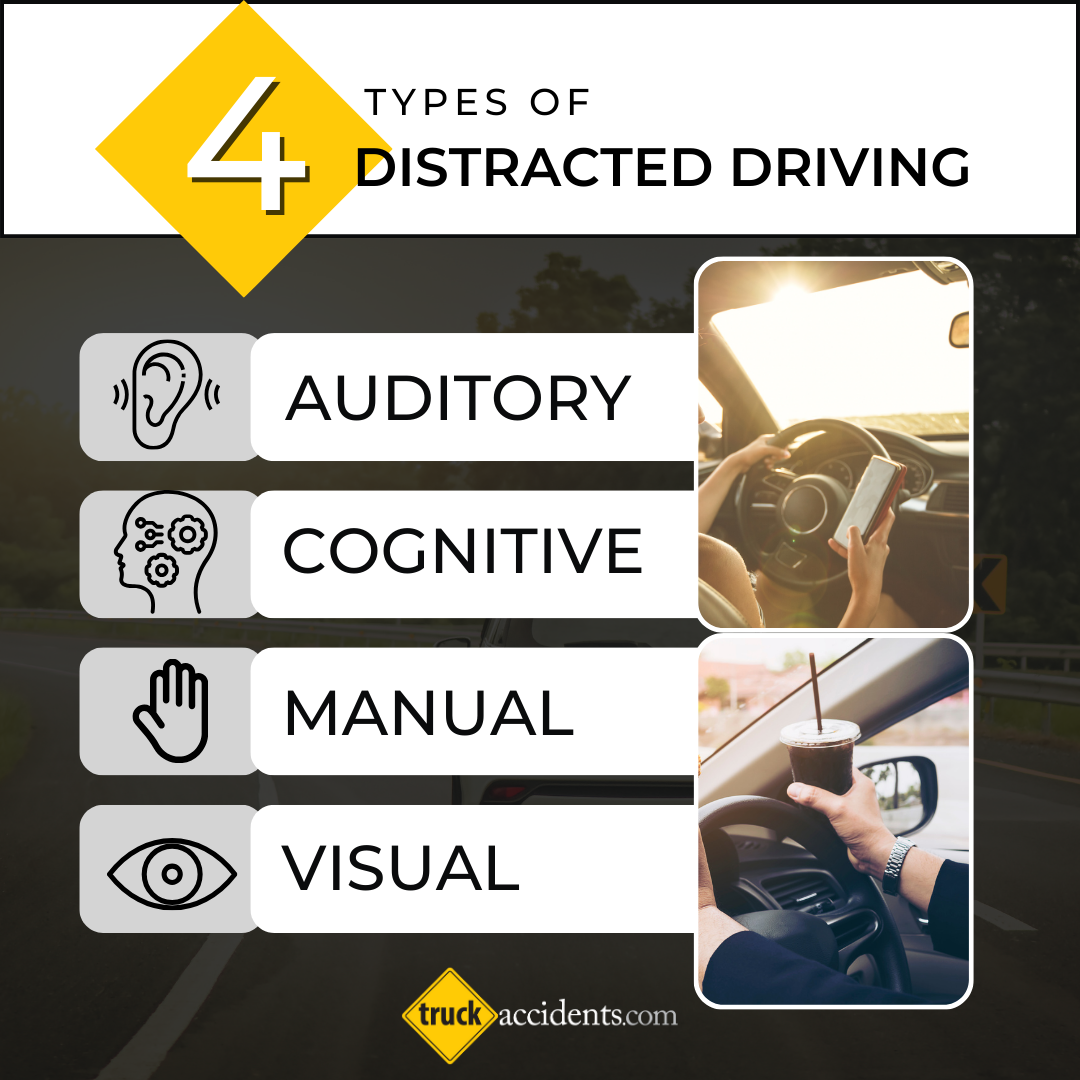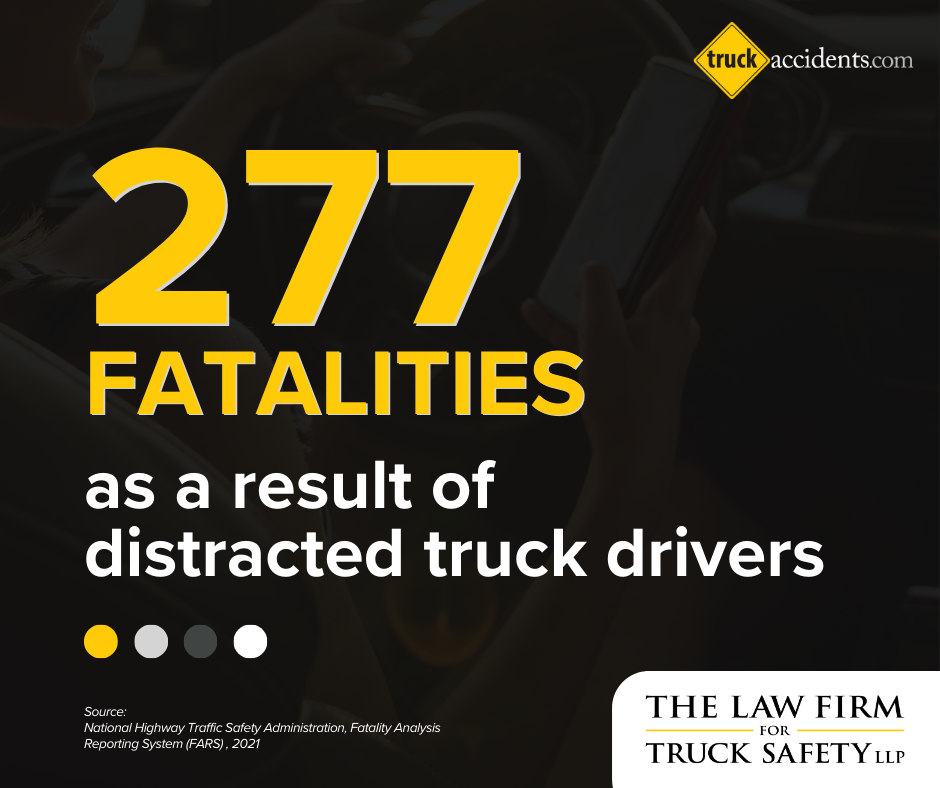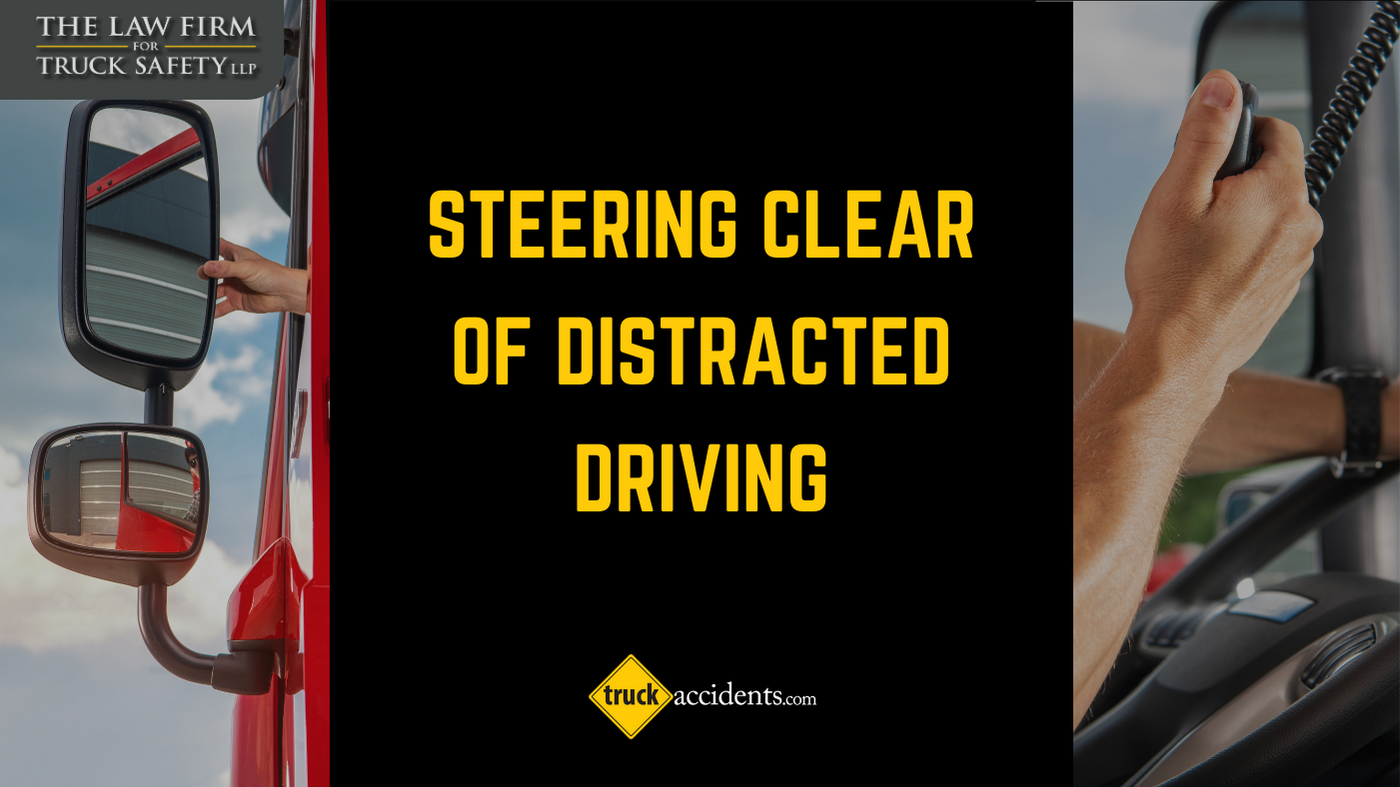When we think of distracted driving, most of us will think of texting and driving or using our smartphones behind the wheel. Yet, the scope of distracted driving extends far beyond cell phone use, encompassing various activities that can shift a driver's focus from the road. These distractions can be just as dangerous as texting and driving, contributing significantly to road crashes each year.
For truck drivers, the list of potential distractions expands, compounded by the inherent challenges of maneuvering larger, heavier vehicles that are more complicated to drive than a sedan or SUV.
Let's dive deeper into understanding these lesser-known distractions faced by truck drivers and uncover effective measures to mitigate their impact, ensuring safer roads for everyone. By broadening our awareness and implementing targeted strategies, we can significantly reduce the risks associated with distracted driving in the trucking industry.
Referrals & Co-Counsel
Involved in a Crash?
No other law firm knows trucks quite like us. Our trucking law expertise and trial experience allow us to win multi-million-dollar results year after year.
Our team of truck accident attorneys works tirelessly to help your family find justice in the wake of a catastrophic truck crash.
Referrals & Co-Counsel
No other law firm knows trucks quite like us. Our trucking law expertise and trial experience allow us to win multi-million-dollar results year after year.
Involved in a Crash?
Our team of truck accident attorneys works tirelessly to help your family find justice in the wake of a catastrophic truck crash.
What is Distracted Driving?
Distracted driving refers to any activity that diverts attention from driving and, as a consequence, reduces a driver’s ability to safely operate their vehicle. Distracted driving isn't just limited to more obvious activities like texting or talking on a cell phone; distracted driving also includes eating, adjusting the radio or navigation system, conversing with passengers, or even daydreaming. These distractions can significantly impair reaction times, decision-making processes, and overall vehicle control, increasing the risk of traffic incidents.
For truck drivers, who spend long hours on the road, managing distractions is crucial for safety.

What Distractions Affect Truck Drivers and How Can They Be Mitigated?
Eating and Drinking
Many truck drivers see no harm in eating a quick meal or sipping a beverage while driving. Afterall, it saves time. However, these actions can significantly distract them. Spilling food or drink, unwrapping a sandwich, or reaching for a dropped item can take your eyes off the road and hands off the wheel, increasing the risk of an accident.
Mitigation Tip:
Prepare meals ahead of time and eat during schedule stops. If you must eat, pull over to a safe location.

Using In-Cab Technology
Trucks today are outfitted with advanced technology like GPS and infotainment systems, intended to improve efficiency and make long drives more bearable. Yet, using these features while driving can lead to significant distractions.
Mitigation Tip:
Set your GPS and music playlist before you start driving. Use voice commands where possible and avoid interacting with touchscreen displays while the vehicle is in motion.
External Distractions

Sights such as billboards, accident scenes, or natural landscapes can easily capture a truck driver’s attention, causing a phenomenon known as rubbernecking.
This not only creates traffic backups but can also lead to collisions.
Mitigation Tip:
Remain focused on the road ahead. Curiosity can lead to unnecessary risks, so it's critical to keep the focus on driving.

Daydreaming On Long Hauls
One of the most insidious forms of distracted driving is daydreaming or losing focus on driving due to wandering thoughts. Long-haul truck drivers are particularly susceptible to this type of cognitive distraction due to the monotony of long stretches of road.
Zoning out can decrease awareness of the driving environment, leading to delayed reactions to traffic conditions.
Mitigation Tip:
Keep your mind engaged with the drive. If you notice your attention waning, consider taking a break or listening to something stimulating, like a podcast or audiobook, that keeps you connected to the act of driving.

Conversations with Co-Drivers or Dispatch
Engaging in decision-making or emotional conversations with passengers can significantly distract a semi driver. Such interactions divert the driver's attention, leading to slower reaction times and missed traffic signals.
Mitigation Tip:
Keep conversations light while driving. If a discussion requires more attention, consider pulling over to continue the conversation safely.
Handling Paperwork and Logs

Many truck drivers are required to keep detailed logs or handle paperwork related to their cargo, routes, and delivery schedules. Attempting to manage these documents while their tractor-trailer is in motion is one of the more dangerous driving distractions as it takes their hands off the wheel and their eyes and mind off the road.
Mitigation Tip:
Organize and review paperwork during breaks or when safely parked. Utilize electronic logging devices (ELDs) to minimize manual input while driving.

Crash. Not Accident.
The word “accident” is often used to describe devastating truck crashes. Many people in need of legal help will search for a “truck accident lawyer near me” or the “best truck accident attorney”. We even use "accident" in our site name.
However, most truck “accidents” are not accidents at all.
Truck crashes are often caused by distracted, fatigued, poorly trained, or downright dangerous truck drivers and/or the unsafe business practices of the trucking companies and brokers that hired them. Every semi-truck accident lawyer at The Law Firm for Truck Safety is committed to helping those who have been irreparably harmed in commercial vehicle crashes and providing education to the public that crashes are not accidents.
Using CB Radios or Communication Devices
While CB radios and other communication devices are vital for staying in touch with dispatchers and other drivers, using them while driving can divert attention from the road.
Mitigation Tip:
Limit the use of communication devices to essential communication only. When possible, use hands-free features and keep conversations brief.

Adjusting Vehicle Settings
Adjusting settings such as the air conditioning, seat position, or mirrors while the vehicle is in motion can lead to momentary distractions.
Mitigation Tip:
Make all necessary adjustments to your seat, mirrors, and vehicle controls before starting your trip. If adjustments are needed while en route, pull over to a safe location first.
Smoking

For drivers who smoke, lighting a cigarette and smoking while driving can be a distraction, requiring drivers to take a hand off the wheel and divert their attention to be mindful of an open flame.
Mitigation Tip:
Plan smoke breaks for times when you can safely pull over. Consider using this as an opportunity to stretch and refresh as well.
Weather and Road Conditions
Adverse weather conditions like rain, snow, or fog require increased concentration and can become a cognitive distraction if a driver is trying to navigate through them while also focusing on other tasks.
Mitigation Tip:
During poor weather conditions, eliminate all non-essential in-cab activities and focus solely on driving. Increase following distances and reduce speed to maintain control.

Conclusion
Truck drivers are the professionals of the roads, entrusted with the vital task of keeping the economy moving. Their dedication to safety and attention to detail are crucial.
By identifying and minimizing potential driving distractions, truck drivers not only lessen their chances of being involved in accidents but also fulfill their duty to maintain safe roadways for everyone.



